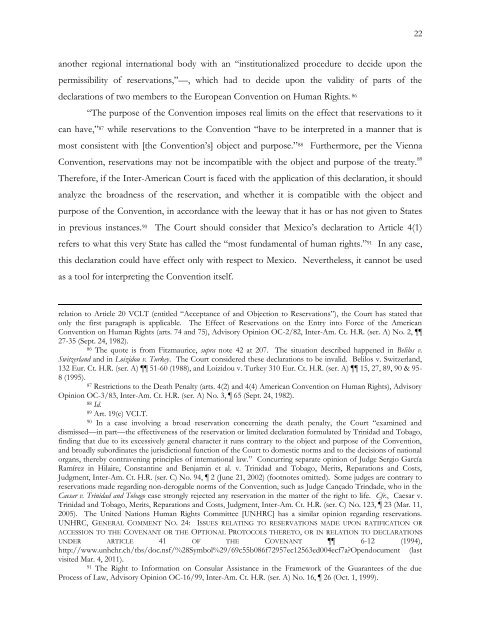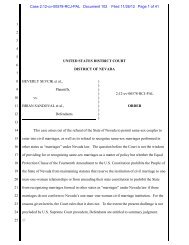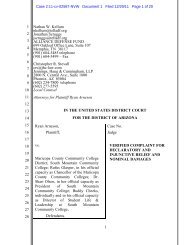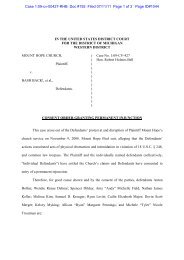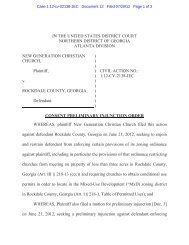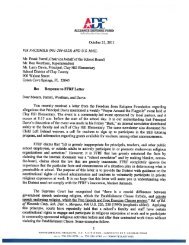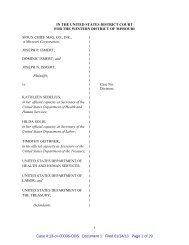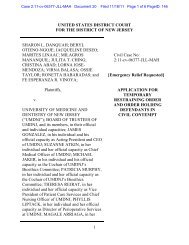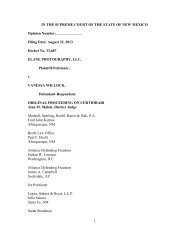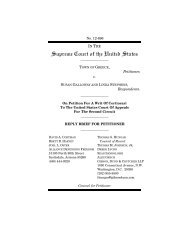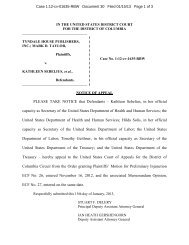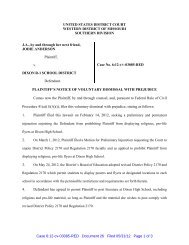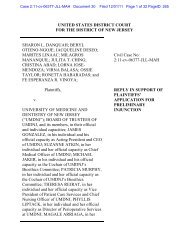English - Alliance Defending Freedom Media
English - Alliance Defending Freedom Media
English - Alliance Defending Freedom Media
Create successful ePaper yourself
Turn your PDF publications into a flip-book with our unique Google optimized e-Paper software.
22<br />
another regional international body with an “institutionalized procedure to decide upon the<br />
permissibility of reservations,”—, which had to decide upon the validity of parts of the<br />
declarations of two members to the European Convention on Human Rights. 86<br />
“The purpose of the Convention imposes real limits on the effect that reservations to it<br />
can have,” 87 while reservations to the Convention “have to be interpreted in a manner that is<br />
most consistent with [the Convention’s] object and purpose.” 88 Furthermore, per the Vienna<br />
Convention, reservations may not be incompatible with the object and purpose of the treaty. 89<br />
Therefore, if the Inter-American Court is faced with the application of this declaration, it should<br />
analyze the broadness of the reservation, and whether it is compatible with the object and<br />
purpose of the Convention, in accordance with the leeway that it has or has not given to States<br />
in previous instances. 90 The Court should consider that Mexico’s declaration to Article 4(1)<br />
refers to what this very State has called the “most fundamental of human rights.” 91 In any case,<br />
this declaration could have effect only with respect to Mexico. Nevertheless, it cannot be used<br />
as a tool for interpreting the Convention itself.<br />
relation to Article 20 VCLT (entitled “Acceptance of and Objection to Reservations”), the Court has stated that<br />
only the first paragraph is applicable. The Effect of Reservations on the Entry into Force of the American<br />
Convention on Human Rights (arts. 74 and 75), Advisory Opinion OC-2/82, Inter-Am. Ct. H.R. (ser. A) No. 2, <br />
27-35 (Sept. 24, 1982).<br />
86 The quote is from Fitzmaurice, supra note 42 at 207. The situation described happened in Belilos v.<br />
Switzerland and in Loizidou v. Turkey. The Court considered these declarations to be invalid. Belilos v. Switzerland,<br />
132 Eur. Ct. H.R. (ser. A) 51-60 (1988), and Loizidou v. Turkey 310 Eur. Ct. H.R. (ser. A) 15, 27, 89, 90 & 95-<br />
8 (1995).<br />
87 Restrictions to the Death Penalty (arts. 4(2) and 4(4) American Convention on Human Rights), Advisory<br />
Opinion OC-3/83, Inter-Am. Ct. H.R. (ser. A) No. 3, 65 (Sept. 24, 1982).<br />
88 Id.<br />
89 Art. 19(c) VCLT.<br />
90 In a case involving a broad reservation concerning the death penalty, the Court “examined and<br />
dismissed—in part—the effectiveness of the reservation or limited declaration formulated by Trinidad and Tobago,<br />
finding that due to its excessively general character it runs contrary to the object and purpose of the Convention,<br />
and broadly subordinates the jurisdictional function of the Court to domestic norms and to the decisions of national<br />
organs, thereby contravening principles of international law.” Concurring separate opinion of Judge Sergio García<br />
Ramírez in Hilaire, Constantine and Benjamin et al. v. Trinidad and Tobago, Merits, Reparations and Costs,<br />
Judgment, Inter-Am. Ct. H.R. (ser. C) No. 94, 2 (June 21, 2002) (footnotes omitted). Some judges are contrary to<br />
reservations made regarding non-derogable norms of the Convention, such as Judge Cançado Trindade, who in the<br />
Caesar v. Trinidad and Tobago case strongly rejected any reservation in the matter of the right to life. Cfr., Caesar v.<br />
Trinidad and Tobago, Merits, Reparations and Costs, Judgment, Inter-Am. Ct. H.R. (ser. C) No. 123, 23 (Mar. 11,<br />
2005). The United Nations Human Rights Committee [UNHRC] has a similar opinion regarding reservations.<br />
UNHRC, GENERAL COMMENT NO. 24: ISSUES RELATING TO RESERVATIONS MADE UPON RATIFICATION OR<br />
ACCESSION TO THE COVENANT OR THE OPTIONAL PROTOCOLS THERETO, OR IN RELATION TO DECLARATIONS<br />
UNDER ARTICLE 41 OF THE COVENANT 6-12 (1994),<br />
http://www.unhchr.ch/tbs/doc.nsf/%28Symbol%29/69c55b086f72957ec12563ed004ecf7a?Opendocument (last<br />
visited Mar. 4, 2011).<br />
91 The Right to Information on Consular Assistance in the Framework of the Guarantees of the due<br />
Process of Law, Advisory Opinion OC-16/99, Inter-Am. Ct. H.R. (ser. A) No. 16, 26 (Oct. 1, 1999).


